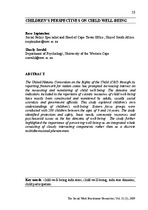Children’s perspectives on child well-being
Abstract
The United Nations Convention on the Rights of the Child (CRC) through its
reporting framework for nation states has prompted increasing interest on
the measuring and monitoring of child well-being. The domains and
indicators included in the repertoire of country measures of child well-being
have mostly been constructed and monitored by adults, usually social
scientists and government officials. This study explored children’s own
understandings of children’s well-being. Sixteen focus groups were
conducted with 200 children between the ages of 9 and 16 years. The study
identified protection and safety, basic needs, community resources and
psychosocial issues as the key domains of well-being. The study further
highlighted the importance of perceiving well-being as an integrated whole
consisting of closely interacting components rather than as a discrete
multidimensional phenomenon.

